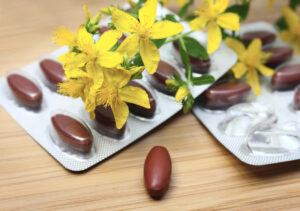Depression is on the rise in the U.S. with the percentage of U.S. adults who report having been diagnosed with depression at some point in their lifetime reaching 29.0%. As of a publication in May 2023, this is nearly 10 percentage points higher than in 2015. The percentage of Americans who currently have or are being treated for depression has also risen, to 17.8%, which is up about seven points compared to 2015.
Women and young adults have experienced the greatest increases and Black and Hispanic adults have risen about twice the rate of White Adults.
We’ve also known for some time, that depression is about twice as prevalent in women compared to men.
Common symptoms include mood swings, persistent sadness, anxiety, low appetite, irritability, sleep issues and loss of motivation and interest and pleasure from activities.
Psychotherapy, medications and behavioral therapy are the mainstay of conventional treatments. The most common pharmaceutical anti-depressant interventions include serotonin reuptake inhibitors (SSRIs) and serotonin-noradrenaline reuptake inhibitors (SNRIs). They can indeed help many individuals, but too often they are not adequately effective and/or cause side effects that the individual finds unacceptable.
Options are always desired and studies have shown that St. John’s wort (SJW; Hypericum perforatum,  Hypericaceae) extract effectively treats depression. SJW has a history of treating mild to moderate depression and its efficacy is sometimes attributed to its ability to regulate neurotransmitters like serotonin, gamma-aminobutyric acid (GABA), and dopamine. Other mechanisms have been proposed as well. While results in all the various studies have been mixed, the overall conclusion is a high degree of safety, low side effects, and good efficacy for mild to moderate depression, and in some studies even severe depression.
Hypericaceae) extract effectively treats depression. SJW has a history of treating mild to moderate depression and its efficacy is sometimes attributed to its ability to regulate neurotransmitters like serotonin, gamma-aminobutyric acid (GABA), and dopamine. Other mechanisms have been proposed as well. While results in all the various studies have been mixed, the overall conclusion is a high degree of safety, low side effects, and good efficacy for mild to moderate depression, and in some studies even severe depression.
The current meta-analysis summarizes the safety and efficacy of SJW to treat depression.
After screening the studies and references in their database search, the final count was 14 studies and a sample size of 2270 patients were included in this review. Patients from these studies were allocated to conventional SSRIs like fluoxetine and sertraline, or placebo, and SJW groups.
A meta-analysis was conducted to assess improvements in Hamilton Depression scores for patients allocated to St. John’s wort or placebo groups. The risk of bias was low. All the results were statistically significant.
The authors of this meta-analysis concluded that SJW was more effective than the placebo and conventional SSRIs in relieving symptoms of mild to moderate depression.
Commentary:
This meta-analysis does not surprise me as I’ve been using St John’s wort in my clinical practice for decades. It is really my number one choice when mild to moderate depression is the main issue. If they have depression and anxiety, I might add Kava or Lavender extract or L-theanine to the plan. I’m also assertive about recommending daily time in nature – forests in particular, as well as regular aerobic exercise, psychotherapy support and low to no alcohol, a known depressant. Typical results are seen in 3-6 weeks. That said, it is always important to recognize when medications are necessary whether it be for depression, anxiety or sleep.
Reference: Zhao X, Zhang H, Wu Y, Yu C. The efficacy and safety of St. John’s wort extract in depression therapy compared to SSRIs in adults: A meta-analysis of randomized clinical trials. Adv Clin Exp Med. February 2023;32(2):151-161.

